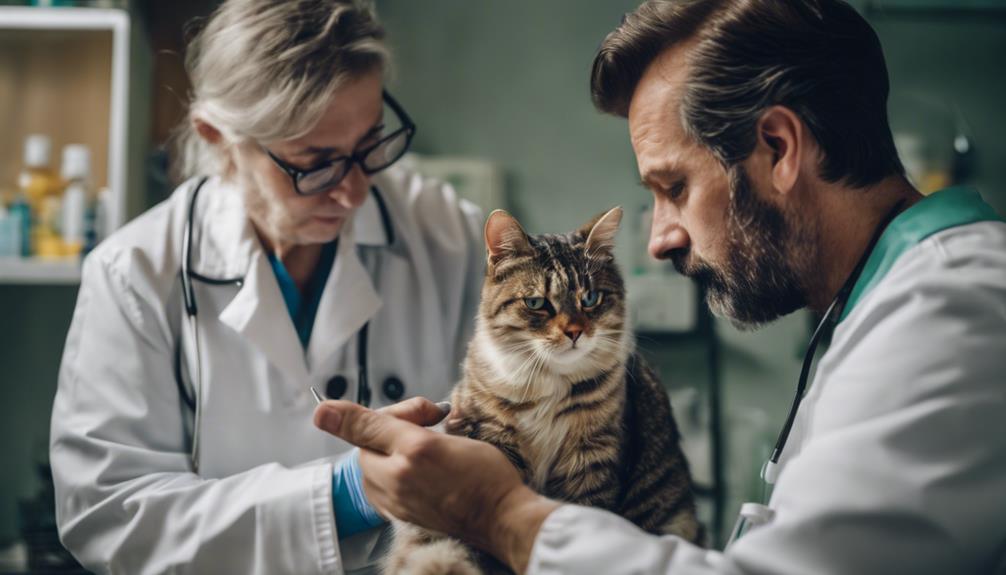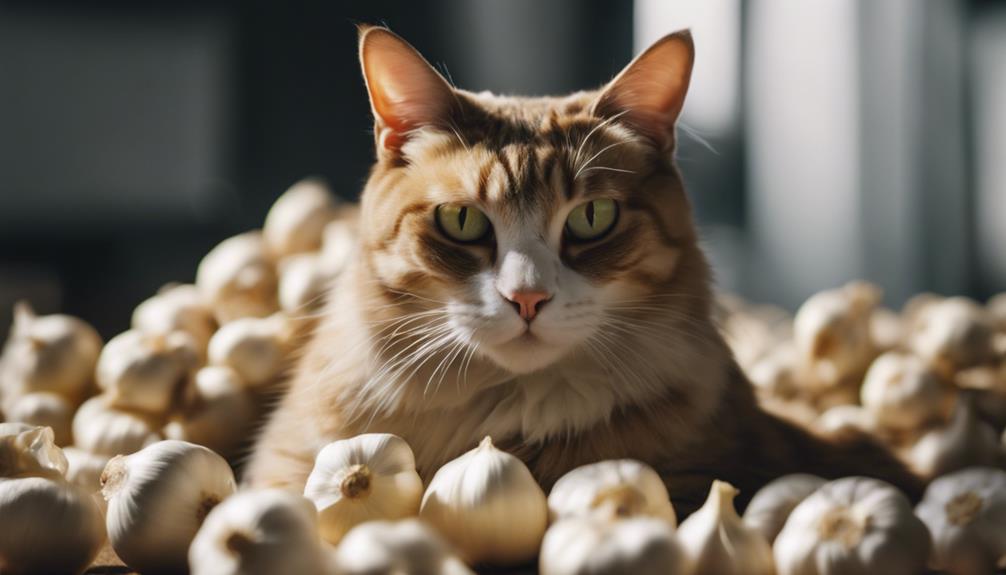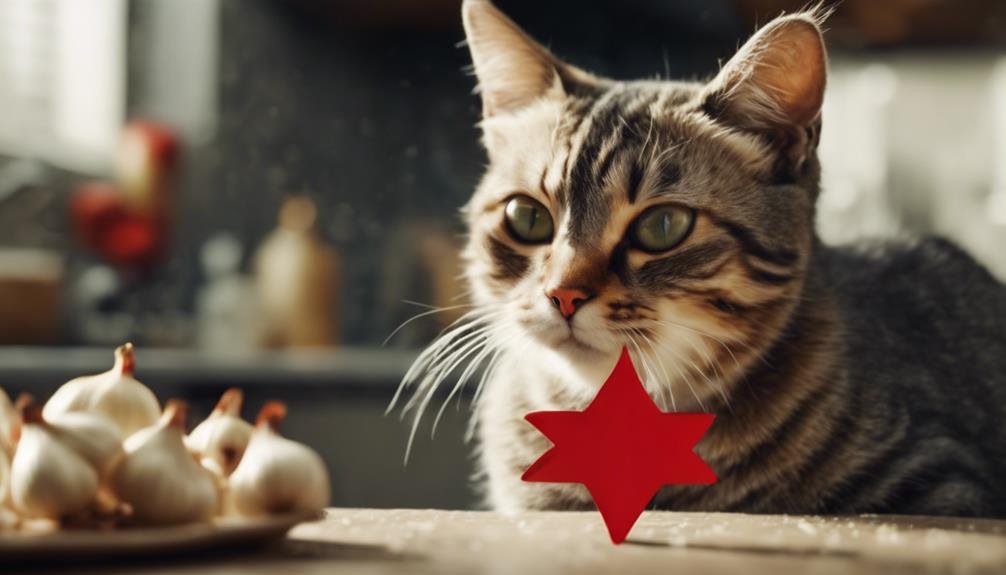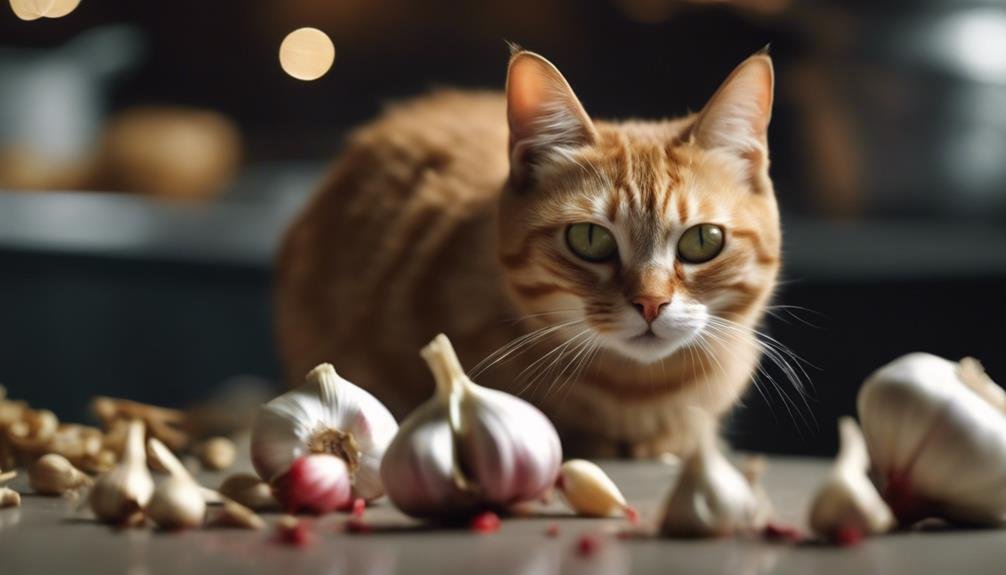Garlic, often praised for its culinary benefits, harbors a dark secret when it comes to our feline companions. The potential risks associated with cats consuming garlic are concerning, with detrimental effects that can impact their health.
Understanding why garlic is toxic to cats is crucial for pet owners looking to safeguard their furry friends. Stay tuned to learn more about the dangers of garlic ingestion in cats, the symptoms to watch out for, and how to take preventive measures to ensure your kitty stays safe and healthy.
Key Takeaways
- Cats should never eat garlic due to its high toxicity levels for felines.
- Garlic can cause serious health issues like anemia and gastrointestinal upset in cats.
- Immediate veterinary care is crucial if a cat ingests garlic to prevent severe consequences.
- Educate yourself on toxic foods like garlic to safeguard your cat's well-being.
Risks of Garlic for Cats
Garlic poses significant risks to cats due to its potential to cause gastrointestinal upset, alter red blood cells, and lead to anemia if consumed. Cats are more susceptible to garlic toxicity than dogs, making it crucial to keep this toxic vegetable away from feline companions.
The gastrointestinal tract of cats can be particularly sensitive to the compounds in garlic, resulting in nausea, vomiting, and diarrhea. Furthermore, garlic's ability to affect red blood cells can lead to anemia, a serious condition that requires prompt treatment.
To safeguard your cat's health, ensure that any food given to them is free of garlic and other harmful substances, and be vigilant in monitoring their well-being to prevent any potential poisoning incidents.
Symptoms of Garlic Poisoning
Symptoms indicative of garlic poisoning in cats can manifest in various ways, serving as crucial indicators for potential toxicity in feline companions. Cats may exhibit transient gastrointestinal upset, depression, weakness, increased breathing and heart rate, exercise intolerance, pale gums, yellowing of the skin, and red-to-brown colored urine. These symptoms might not appear immediately, sometimes taking days to become evident. Monitoring your cat closely for these signs is essential for early detection and treatment of garlic poisoning. Below is a table summarizing the common symptoms of garlic poisoning in cats:
| Symptoms | Description |
|---|---|
| Gastrointestinal upset | Transient digestive issues |
| Depression | Behavioral changes and lethargy |
| Weakness | Lack of strength and energy |
| Increased breathing and heart rate | Elevated respiratory and cardiac activity |
| Pale gums | Abnormal coloration of the gums |
| Yellowing of skin and red-to-brown urine | Physical discoloration indicators |
Treatment for Garlic Toxicity

When addressing cases of garlic toxicity in cats, prompt veterinary intervention is crucial for successful treatment and recovery. If your cat ingests garlic, induce vomiting if it's within a couple of hours and seek immediate veterinary care.
Treatment for garlic poisoning in cats may involve administering fluids, anti-nausea medications, and antioxidants. In severe cases, a blood transfusion may be necessary to address anemia. It is essential to monitor your cat's vital signs during treatment and provide detailed information about symptoms and the amount of garlic consumed.
Allium Family Vegetables to Avoid
Are there other vegetables in the Allium family that cats should avoid aside from garlic?
Yes, cats should also steer clear of chives, leeks, onions, scallions, and shallots. These vegetables contain compounds that can be harmful to cats, leading to various health issues.
Poisoning in cats can result from either a single significant exposure or chronic smaller ingestions over time. The toxic properties of Allium family vegetables can have serious consequences for feline health.
It's essential to be mindful of what foods your cat has access to and ensure they are kept away from these potentially harmful vegetables. Being aware of the dangers of these vegetables can help prevent accidental consumption and keep your feline companion safe and healthy.
Toxicity of Garlic Spices

The potential toxicity of garlic spices, particularly in relation to cats, underscores the importance of understanding the risks associated with these seasonings in feline diets.
While garlic itself is known to be harmful to cats, the concentrated form found in garlic spices can pose an even greater danger. Gram-for-gram, garlic spices are more potent and can have severe consequences if ingested by cats.
These seasonings can lead to gastrointestinal upset, damage to red blood cells, and potentially life-threatening conditions like anemia. It is crucial for cat owners to be vigilant about the ingredients present in their feline's food, avoiding any products that contain garlic spices to ensure the health and well-being of their beloved pets.
Guidelines for Cat Treats
To ensure optimal feline health, it is essential for cat owners to carefully select and provide appropriate treats for their beloved pets. When choosing cat treats, consider the following guidelines:
- Nutritional Value: Opt for treats that are balanced and nutritious to complement your cat's diet.
- Limited Ingredient List: Choose treats with a short ingredient list to minimize potential allergens or harmful additives.
- Suitable Texture: Select treats with a texture that is safe for your cat to consume and digest easily.
- Moderation: Remember that treats should only account for up to 10% of your cat's daily caloric intake to prevent overfeeding and maintain a healthy weight.
Preventing Garlic Consumption

Cat owners must diligently ensure that their feline companions are kept away from any sources of garlic to prevent potential toxicity and health complications. It is crucial to check all human foods given to cats for the presence of garlic.
Avoid feeding cats any food seasoned with garlic, such as garlic salt or powder. When preparing cat treats, cook them thoroughly and refrain from adding any garlic.
It is essential to educate oneself on other toxic foods in the Allium family that cats should avoid to maintain their well-being. By being vigilant and proactive in preventing garlic consumption, cat owners can safeguard their furry friends from the harmful effects of this toxic vegetable.
Monitoring Cats for Symptoms
Vigilantly observing for subtle changes in behavior and physical appearance is crucial in detecting potential symptoms of garlic poisoning in felines. Here are some signs to watch for:
- Behavior Changes: Keep an eye out for increased lethargy or depression in your cat.
- Physical Symptoms: Check for weakness, increased breathing, or heart rate abnormalities.
- Exercise Intolerance: Note if your cat seems more tired or less willing to play.
- Gum Color: Monitor the color of your cat's gums; pale gums can indicate an issue.
Educating on Allium Family Foods

Educating pet owners about the potential dangers of allium family foods is vital in safeguarding the health of their feline companions. To help you navigate the world of allium family vegetables and keep your kitty safe, here's a handy guide outlining some key information:
| Toxic Allium Family Foods | Potential Dangers |
|---|---|
| Chives | Gastrointestinal upset |
| Leeks | Alteration of red blood cells |
| Onions | Interference with oxygen transport |
| Scallions | Anemia if untreated promptly |
Conclusion
In conclusion, the dangers of garlic for cats are akin to navigating a treacherous path filled with potential harm.
With the toxic nature of garlic well-established, pet owners must remain vigilant in preventing their feline companions from ingesting this harmful vegetable.
By understanding the risks, recognizing the symptoms of garlic poisoning, and taking appropriate treatment measures, responsible pet owners can safeguard their beloved cats from unnecessary harm and ensure their well-being.




